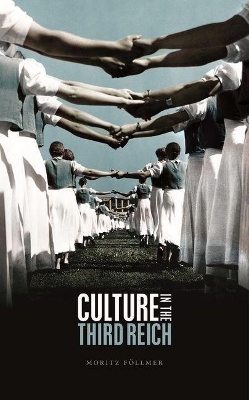
Culture in the Third Reich
Seiten
2020
Oxford University Press (Verlag)
978-0-19-881460-3 (ISBN)
Oxford University Press (Verlag)
978-0-19-881460-3 (ISBN)
A study that gets us closer to solving the mystery of why so many Germans embraced the Nazi regime so enthusiastically and identified so closely with it.
'It's like being in a dream', commented Joseph Goebbels when he visited Nazi-occupied Paris in the summer of 1940. Dream and reality did indeed intermingle in the culture of the Third Reich, racialist fantasies and spectacular propaganda set-pieces contributing to this atmosphere alongside more benign cultural offerings such as performances of classical music or popular film comedies.
A cultural palette that catered to the tastes of the majority helped encourage acceptance of the regime. The Third Reich was therefore eager to associate itself with comfortable middle-brow conventionality, while at the same time exploiting the latest trends that modern mass culture had to offer. And it was precisely because the culture of the Nazi period accommodated such a range of different needs and aspirations that it was so successfully able to legitimize war, imperial domination, and destruction.
Moritz Föllmer turns the spotlight on this fundamental aspect of the Third Reich's successful cultural appeal in this ground-breaking new study, investigating what 'culture' meant for people in the years between 1933 and 1945: for convinced National Socialists at one end of the spectrum, via the legions of the apparently 'unpolitical', right through to anti-fascist activists, Jewish people, and other victims of the regime at the other end of the spectrum. Relating the everyday experience of people living under Nazism, he is able to give us a privileged insight into the question of why so many Germans enthusiastically embraced the regime and identified so closely with it.
'It's like being in a dream', commented Joseph Goebbels when he visited Nazi-occupied Paris in the summer of 1940. Dream and reality did indeed intermingle in the culture of the Third Reich, racialist fantasies and spectacular propaganda set-pieces contributing to this atmosphere alongside more benign cultural offerings such as performances of classical music or popular film comedies.
A cultural palette that catered to the tastes of the majority helped encourage acceptance of the regime. The Third Reich was therefore eager to associate itself with comfortable middle-brow conventionality, while at the same time exploiting the latest trends that modern mass culture had to offer. And it was precisely because the culture of the Nazi period accommodated such a range of different needs and aspirations that it was so successfully able to legitimize war, imperial domination, and destruction.
Moritz Föllmer turns the spotlight on this fundamental aspect of the Third Reich's successful cultural appeal in this ground-breaking new study, investigating what 'culture' meant for people in the years between 1933 and 1945: for convinced National Socialists at one end of the spectrum, via the legions of the apparently 'unpolitical', right through to anti-fascist activists, Jewish people, and other victims of the regime at the other end of the spectrum. Relating the everyday experience of people living under Nazism, he is able to give us a privileged insight into the question of why so many Germans enthusiastically embraced the regime and identified so closely with it.
Moritz Föllmer is Associate Professor of Modern History at the University of Amsterdam, and the author of a number of books and articles on identity and culture in twentieth century Germany, including most recently Individuality and Modernity in Berlin: Self and Society from Weimar to the Wall (2013).
Introduction: 'Living in a Dream'
1: From Weimar Culture to 'German' Culture
2: National Socialism as a Cultural Synthesis
3: Towards a 'Pure' Culture
4: Wars of Culture
5: Culture of Destruction
Conclusion
Index
| Erscheinungsdatum | 15.04.2020 |
|---|---|
| Verlagsort | Oxford |
| Sprache | englisch |
| Maße | 142 x 224 mm |
| Gewicht | 440 g |
| Themenwelt | Geschichte ► Allgemeine Geschichte ► 1918 bis 1945 |
| Geisteswissenschaften ► Geschichte ► Regional- / Ländergeschichte | |
| Geschichte ► Teilgebiete der Geschichte ► Militärgeschichte | |
| Sozialwissenschaften ► Politik / Verwaltung ► Politische Systeme | |
| Sozialwissenschaften ► Politik / Verwaltung ► Politische Theorie | |
| ISBN-10 | 0-19-881460-7 / 0198814607 |
| ISBN-13 | 978-0-19-881460-3 / 9780198814603 |
| Zustand | Neuware |
| Haben Sie eine Frage zum Produkt? |
Mehr entdecken
aus dem Bereich
aus dem Bereich
ein Psychologe erlebt das Konzentrationslager
Buch | Hardcover (2024)
Kösel (Verlag)
CHF 30,80
Mythos „Stauffenberg-Attentat“ – wie der 20. Juli 1944 verklärt und …
Buch | Hardcover (2024)
Goldmann (Verlag)
CHF 33,55


